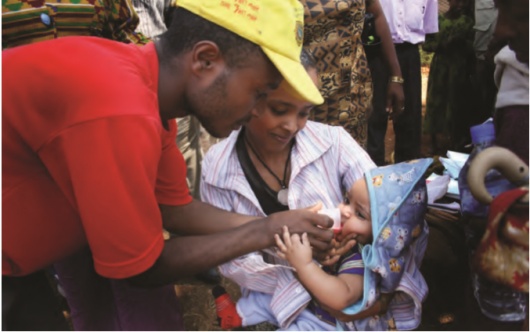Task Force for Global Health: Secretariat to Global Organization

Beginning in 1984 as the Task Force for Child Survival, the Task Force for Global Health started as a leading secretariat for various international health organizations such as UNICEF, The Rockefeller Foundation, and the World Bank. The Task Force worked alongside these global health organizations to design and improve effective child and family wellness, healthcare and survival strategies.
Thirty years later, the Task Force for Global Health has grown into a global nonprofit organization for public health. According to Forbes Magazine, the Task Force is the fourth largest nonprofit in the U.S. Headquartered in Decatur, Georgia, and under the leadership of public health expert Dr. Mark Rosenberg since 1999, the organization stands as the biggest nonprofit in Georgia since its expansion in 2013.
The Task Force focuses on three major areas: improving the efficiency of public health systems and field epidemiology, providing accessible treatment of immunizations and vaccines and eradicating neglected tropical diseases.
However, despite the Task Force’s incredible reputation and longstanding credentials, it remains largely unknown to a majority of the world. In an interview conducted by Georgia Center for Nonprofits’ (GCN) quarterly magazine, Georgia Nonprofit NOW, Rosenberg explains that keeping the Task Force under wraps was not only an intentional but effective strategy.
Rosenberg told GCN, “From the beginning, we have always tried to build coalitions, but it’s not always easy to get organizations to work together. If you want a partnership to work, our founder Bill Foege taught us, you’ve got to shine the light on your partners, and not on yourselves. We focus attention on our partners, and as a result, we are not well known in Georgia.”
The Task Force’s decision to maintain a low-key profile has resulted in high effectivity, not only as a major collaborator to some of the world’s most well-known nonprofit organizations but also as a large scale mobilizer towards peace and health care reform.
The Task Force for Global Health has managed to cover an incredible amount of ground in improving healthcare and offering accessible vaccinations and treatments to approximately 495 million people in 149 countries. The organization provides support and professional level healthcare training programs in 43 countries around the world, which results in widespread, efficient and accessible health care globally. Having formed strong partnerships with private and public healthcare providers and programs worldwide, the Task Force for Global Health has and continues to succeed in bringing about incredible reform and is changing the lives of millions of people every day.
– Jenna Salisbury
